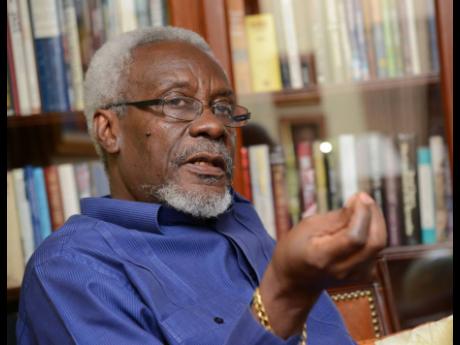Patterson: Time to exonerate Garvey
Former Prime Minister P. J. Patterson has said that the petition for posthumous exoneration of Marcus Mosiah Garvey, Jamaica’s first national hero, deserves the unwavering support of every citizen of the world who stands for justice and equality under the law – not just those with African ancestry.
The petition, which is seeking to raise 100,000 signatures, is pushing for the expunging of the criminal record of the philosopher and black-consciousness advocate, who was convicted in the United States of mail fraud in 1923.
“Pardons are to grant immunity or to remove any legal disabilities such as the right to vote, which convicted felons do not have. Exoneration is for the innocent, those who should have been acquitted at trial because there was no wrongdoing. It is my contention, there was no evidence given during the trial on which a conviction could be based,” Patterson said yesterday during the Vice-Chancellor’s Forum on Exonerating Garvey – a collaborative effort by The University of the West Indies, The P. J. Patterson Centre for Africa-Caribbean Advocacy, and The Centre for Reparation Research.
“We are not begging in this global campaign for mercy, or pleading for pardon, as Marcus Garvey committed no crime, was not guilty of any offence [or] of moral turpitude, but J. Edgar Hoover had got his way to deport a man of the utmost integrity and far-reaching vision,” Patterson said, making reference to the former director of the Federal Bureau of Investigation.
Patterson said that many learned jurists from across the world have found the trial “replete with glaring instances of prosecutorial misconduct”.
In 1922, Garvey was indicted, along with three directors of the Black Star Line, on charges of conspiracy to use the United States Postal Service in furtherance of a scheme to defraud. Choosing to represent himself, Garvey was the only one convicted.
In 1927, his remaining sentence was commuted amid protests from Black Americans, and he was deported to Jamaica.
An eminent attorney-at-law himself, Patterson said that the presiding judge had failed to demonstrate a comprehension of simple, fundamental legal tenets.
The prosecution had not established that the mail was sent from a post office in the Southern District of New York by Marcus Garvey, or on his orders, soliciting shares in a company which was either defunct or bankrupt.
The only exhibit offered was the front and back of an empty envelope marked Black Star Line, which the main witness – a 19-year-old temporary worker – did not testify to receiving, but merely said that he recognised. He had also told the court that he could not recall what was in the envelope.
Patterson further argued that it was only a reasonable assumption – not proven – that the envelope contained matter from the Black Star Line.

